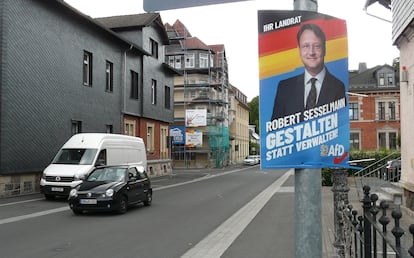Germany’s far-right AfD party wins vote to lead district for the first time
The group’s candidate has won the election in Sonneberg with 53% of the votes, and there are fears that this is just the beginning


Germany’s far-right Alternative for Germany (AfD) party has won elections in the Sonneberg district in the eastern state of Thuringia. This makes Sonneberg — which is home to around 57,000 people — the first German administration to be governed by the far-right group. AfD candidate Robert Sesselman, who is a deputy in the Thuringian Parliament, won a runoff vote on Sunday, securing 53% of the vote to defeat his rival Jürgen Köpper, from the Christian Democratic Union (CDU). His victory comes after other parties tried to isolate the far-right politician. All political groups, including Die Linke (The Left), called on voters to support the CDU candidate.
All eyes have been on Sonneberg, one of the smallest of Germany’s 400 administrative districts, since the AfD won the first round of the elections 15 days ago. The result shocked Thuringia, as well as Berlin. Germany’s political parties have refused to work with the far-right party since it was founded, just over a decade ago.
The victory in Sonneberg is the latest success for a party that is capitalizing on the wave of discontent sweeping through Germany, particularly in the east. Polls show that in the states that made up the former German Democratic Republic (GDR), the AfD would win the federal elections with more than 30% of the vote. Disenchantment with the coalition of Social Democratic (SDP) Chancellor Olaf Scholz — who governs with the Greens and the liberals of the Free Democratic Party (FDP) — has been growing in recent months. According to voter intention polls, the SPD has fallen to third place in Germany, behind of the CDU and the far right.
The AfD has managed to capitalize on the population’s disenchantment with politics, reservations about immigration and fear of an economic crisis. Recent controversies — in particular a new government law that would force buildings to use renewable energy instead of oil and gas for heating — have also helped boost support for the far right, which is between 19 and 20%, according to polls.
The AfD’s victory in Sonneberg, which is one of the 17 rural districts of Thuringia (which is made up of another six urban districts), has raised alarm bells in Berlin, with many fearing this could be just the beginning. The far-right party is also leading in the polls for the district election in Dahme-Spree, in Brandenburg, which will be held in October. And polls suggest the states of Saxony, Thuringia and Brandenburg could fall to the far right when they vote next year.

The far-right party is under surveillance by German spy services, which suspect it of threatening constitutional values. In the state of Thuringia, it is considered outright “extremist” and its members are monitored by the police intelligence agency Federal Office for the Protection of the Constitution (BfV). The leader of the AfD in Thuringia is Björn Höcke, a controversial figure who is one of the most radical of the party’s top officials. Höcke is also under surveillance, as he is suspected of being a right-wing extremist who is threatening Germany’s constitutional order.
AfD was created in 2012 as an Eurosceptic party at the height of the euro crisis. With the 2015 refugee crisis, it took on an anti-immigration position, and with the Covid-19, pandemic, it tried to take advantage of the protests against the lockdown restrictions. Since then, it has been gaining influence by channeling the population’s discontent with the political class. Fears over how the war in Ukraine may negatively impact Germany, the energy crisis and opposition to the government’s ecological transition policies have done the rest. Disenchanted voters have not turned to the conservative opposition, but rather to the AfD.
Just a few days ago, the BfV claimed that the far right was the biggest threat to democracy in Germany and warned voters against supporting the AfD. The leader of the CDU, Friedrich Merz, has said on several occasions that his party will never make deals with the AfD, neither in the European Parliament, nor in the Bundestag nor in the regional parliaments.
Sign up for our weekly newsletter to get more English-language news coverage from EL PAÍS USA Edition
Tu suscripción se está usando en otro dispositivo
¿Quieres añadir otro usuario a tu suscripción?
Si continúas leyendo en este dispositivo, no se podrá leer en el otro.
FlechaTu suscripción se está usando en otro dispositivo y solo puedes acceder a EL PAÍS desde un dispositivo a la vez.
Si quieres compartir tu cuenta, cambia tu suscripción a la modalidad Premium, así podrás añadir otro usuario. Cada uno accederá con su propia cuenta de email, lo que os permitirá personalizar vuestra experiencia en EL PAÍS.
¿Tienes una suscripción de empresa? Accede aquí para contratar más cuentas.
En el caso de no saber quién está usando tu cuenta, te recomendamos cambiar tu contraseña aquí.
Si decides continuar compartiendo tu cuenta, este mensaje se mostrará en tu dispositivo y en el de la otra persona que está usando tu cuenta de forma indefinida, afectando a tu experiencia de lectura. Puedes consultar aquí los términos y condiciones de la suscripción digital.








































